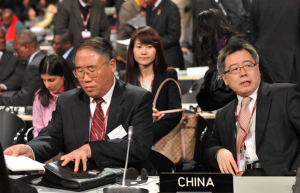
On Tuesday, in an official letter to the UNFCCC signed by China’s climate negotiator Su Wei, China officially expressed its willingness to be associated with the Copenhagen Accord. To be precise, the one-sentence letter confirmed that “the [UNFCCC] Secretariat can proceed to include China in the list of Parties included in the chapeau of the Copenhagen Accord” (the preamble to the Accord).
China's official decision comes on the heels of a similar decision from India. Having these two major countries formally associate with the Accord alleviates some previous concerns about their engagement while breathing new life into the international agreement.
Long before Tuesday’s announcement, China made its intentions clear by confirming that it endorsed the outcome of the Accord (as I blogged about here) and was moving forward with actions to control its greenhouse gas emissions (as I blogged about here). Nonetheless, having China and India officially join the list of countries in the preamble is an invaluable new step. The Copenhagen Accord is currently endorsed by over 100 countries, including all of the world's largest economies and largest emitters, and covers more than 80% of the world's emissions.
On Wednesday, in front of the annual session of the National People’s Congress, China’s chief climate negotiator, Xie Zhenhua, reiterated China’s support for the Copenhagen Accord emphasizing his hopes that the next round of international negotiations in Mexico later this year will be successful. Xie also highlighted that under the requirements of the Copenhagen Accord, China has agreed to submit an inventory report every two years to the UN Secretariat of its actions to reduce its emissions.
When asked by a reporter whether the United States’ inaction on climate change was the largest barrier to reaching an international climate agreement, Xie answered that he recognizes the political obstacles that exist in the U.S. at the moment, but he hopes that the U.S. won’t as a result of its domestic political constraints end up pushing America’s responsibility onto the rest of the world. My colleague Alex Wang will be blogging about this conference in more detail shortly.
In addition to the annual session of the National People’s Congress, another top political body in China, the National Committee of the Chinese People’s Political Consultative Conference (CPPCC) is also holding its annual meeting. During this year’s CPPCC session, Chinese leaders have made a number of significant announcements related to climate change and the environment.
On Tuesday, the Ministry of Finance (MoF) highlighted China’s substantial budget allocations for clean energy and energy efficiency over the past four years and for the coming year. China is investing heavily in clean energy and energy efficiency projects and the MoF revealed the following statistics:
- Between 2007 and 2009, MoF spent 102 billion RMB (approx. $15 billion USD) on increasing the share of clean energy in China’s total energy portfolio.
- China is also spending billions on innovation. Since 2008, China has allocated tens of billions of RMB through national innovation programs, such as the 863 Program (“The National High-Tech R&D Program”) and the 973 Program (“The National Basic Research Program”).
- This year, MoF has allocated 50 billion RMB (approx. $7.3 billion USD) for energy-efficiency and emissions reductions projects (up 20 billion RMB from last year), as well as 10.9 billion RMB (approx. $1.6 billion USD) for renewable energy development (up 3 billion RMB from last year).
These numbers illustrate that China is pushing into new markets and expanding its research and development capabilities in the clean energy sector.
In addition, “low-carbon development” has been the buzzword of this year’s annual legislative session. One topic of debate at the CPPCC session is whether China should implement a carbon tax. One CPPCC member specifically cited the American Clean Energy and Security Act (ACES) passed by the House as one reason why China should consider implementing a carbon tax, since ACES contained a provision that would tax imports from countries that don’t take certain actions to reduce their emissions:
Jia also pointed out that the levying of a carbon tax can reduce risks of being hurt in international trade friction, as some developed countries have mulled levying such a tax and will also likely impose carbon tariffs on imported products from other countries that do not have quotas for emissions reductions -- like the American Clean Energy and Security Act passed by the U.S. House of Representatives last June. "But if we have already levied a carbon tax in China, the other countries would be suspected of double taxation by imposing carbon tariffs, which violates World Trade Organization agreements," he said.
The wheels are spinning worldwide as the fight to counter climate change presses on. The interconnections of this global problem are reflected in how interconnected the solutions must be. The fact that China is considering U.S. domestic policy while formulating its own response to climate change and that China and India have signed on to the Copenhagen Accord, illustrates once again the global nature of these issues and highlights the possibility for collaboration, cooperation and competition in achieving solutions.
This post originally appeared on NRDC's Switchboard.
Barbara Finamore is the Natural Resources Defense Council's China Program Director. NRDC is a non-profit organization dedicated to protecting the environment, people and animals. NRDC was founded in 1970 and is comprised of more than 300 lawyers, scientists and policy experts, with more than one million members and e-activists.

